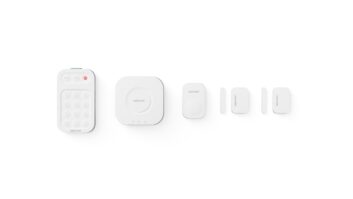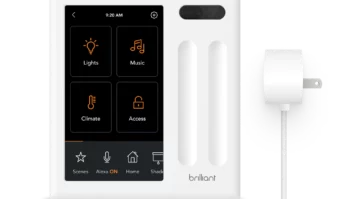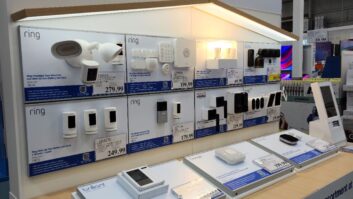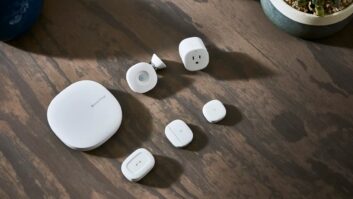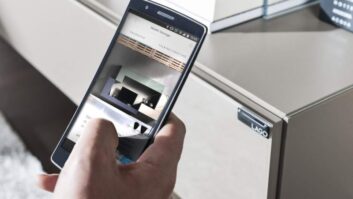NEW YORK — The fledgling home-automation market is growing quickly and continuing to attract new companies.
Some of the newest entrants include Ecovent, Snupi Technologies, Cielo WiGle and Droplit. iDevices, the maker of Bluetooth kitchen and outdoor-grill thermometers, also plans an entry.
The newcomers enter a market whose U.S. unit sales will grow in 2015 by 20 percent to 24.9 million units and grow at 20 percent rates in 2016 and 2017, a Parks Associates/Consumer Electronics Association (CEA) report shows. The units include smart thermostats, networked cameras, smart door locks, water-leak detectors, smart smoke and CO detectors, smart light bulbs and switches, smart plugs and outlets, smart power strips, and the like.
Despite the gains, only 10 percent of U.S. households have at least one smart-home device, and no single device has an ownership rate exceeding 6 percent, the Parks/CEA survey found.
The survey also found that 62 percent of broadband-connected households in the U.S. are unfamiliar with smart-home products, almost 70 percent don’t know where to buy them, but 20 percent intend to buy one or more smart-home devices in the next 12 months.
The addition of home-automation products in Walmart and Target stores, and the launch of home-automation sections in Best Buy stores, will likely help increase awareness. Target is testing home-automation products in about 500 of its roughly 1,800 stores, and Walmart is rolling out home-automation displays in 1,700 stores.
The rollouts could also boost brand awareness, which is low, Parks/CEA found. The two companies with the highest unaided brand awareness are AT&T and ADT, both of which were named by only 6 percent 7 percent of surveyed respondents.
The latest newcomers to the field have even less awareness, at least for now.
Here’s who they are and what they offer:
Ayla Networks: The Internet of Things platform provider is teaming up with OEM CE manufacturer Ever Win International to develop Wi-Fi-equipped smart plugs that will be unveiled at International CES.
The products, targeted to CE suppliers to offer their own-brand models, will connect to the Internet through Ayla’s Cloud Services to let consumers remotely dim lights, and to manage security cameras or other products from a smart phone. The initial products will enable basic on/off control of appliances, lights, lamps and the like via a timer, schedule or direct control from a smartphone. Features as lamp dimming capability are on the product roadmap, a spokesperson told TWICE.
The Wi-Fi plug would plug into an electrical outlet, and products such as a lamp would plug into the Wi-Fi plug.
The companies contended their smart plug will be “relatively smaller than other smart plugs on the market and sold at a more affordable price point.”
Cielo WiGle: The Redmond, Wash., company is a Kickstarter-funded start-up that plans May 2015 availability of a hub-less system that consists of four products, all with Wi-Fi for control and three with Bluetooth LE. The WiLi is a Bluetooth/Wi-Fi adapter that converts any light-bulb socket into a smart light. Adapters are available for Edison, bayonet and downlight sockets. The WiCam is a Wi-Fi security camera that stores video on an SD card, streams video to a mobile device, and features two-way audio. It detects motions and sends alerts. The WiGle incorporates Bluetooth LE, Wi-Fi and IR blaster to control major-brand TVs and air conditioners. WiSe, incorporating Wi-Fi and Bluetooth, can be attached to objects to detect motion and ambient temperature and humidity. The sensor emits an audible alert when users press a locate button on their app.
WiGle and WiSe run on rechargeable batteries. The WiCam plugs into an electrical outlet.
Package prices start at $149 for one WiLe and one WiGle and range up to $1,000 for eight of each type of device, for a total of 32 devices.
Droplit: The Melbourne, Fla., start-up launched a Kickstarter campaign for its system, which consists of a wireless hub, a Cue handheld remote, and control apps for iOS, Android and Windows Phone devices.
The hub incorporates Bluetooth 4.0 LE, Wi-Fi and a USB port to add a Z-wave dongle. The hub controls control Philips Hue Smart Bulbs, LIFX Smart Bulbs, Sonos speakers, Belkin WeMo and WeMo Insight appliance switches, Z-Wave light switches and dimmers, and Z-Wave door and window sensors. The company also plans integration with Versifli Lumen Bluetooth Bulbs and the Nest thermostat.
Packages include a $224 package consisting of a hub and two Cue remote controls
The Droplit apps not only control home systems but let users set up the hub, add devices, create room groups, create scenes and configure the Cue remote.
Availability is scheduled for around July 2015, if funding goals are reached, through the company’s web site (www.getdroplit.com) and Amazon.
Ecovent: The two-year-old company has developed a smartphone-controlled smart-thermostat system that integrates with existing central AC systems and forced-air heating systems to deliver room-by-room temperature control.
Ecovent’s system, designed for DIYers, will launch next year through its website, but the company also plans to develop sales channels that include HVAC installers, contractors, builders, property managers and custom installers in the A/V and home-automation markets.
The cost for a typical home is $1,800, or about $200 per room, in contrast to about $10,000 to add room-by-room zoning using existing methods that require the installation of baffles in ducts and wiring, said founder/CEO Dipul Patel. These installs take days, but Ecovent will reduce that to hours, he said.
With Ecovent’s system, consumers plug in a sensor over an existing electrical outlet in each room. The sensor comes with pass-through plugs so users can continue to plug in lamps and appliances. The housing, which protrudes about an inch from the wall, also features two USB charges, one on each side. Next, consumers replace existing vents in the room with battery-operated motorized vents, which open or close depending on the temperature selected by a user’s Android or iOS app. Vents will be available in the most common sizes. Battery life will be at least three years.
The sensor and vents communicate via sub-GHz wireless frequencies with a hub that runs Ecovent’s control algorithm. The sub-GHz network is said to be optimized for long range and low power.
The hub also features Wi-Fi to accept commands from smartphones and tablets, and it includes wireless ZigBee to connect to smart thermostats.
The products will ship in the U.S. from the company’s site in August 2015. The company is currently accepting applications from contractors on the Pro’s page of the company website and will roll out program details in early 2015.
The system was developed at MIT by Patel. Company investors include Otter Consulting and Boston Syndicates (BOSS), a syndicate group founded by Atlas Venture to invest in local start-ups. Other investors include Stewart Alsop.
iDevices: The maker of Bluetooth LE kitchen and outdoor-grill thermometers said it expects to be the first out of the gate with an Apple-certified HomeKit that it will display at International CES and ship soon after. Apple hasn’t yet certified any HomeKit devices under its MFi program.
iDevices’ first Home Kit product will not be cooking-related, a spokesperson said. Whatever the product is, it will work with the iDevices Connected app and iOS 8.0+ devices and offer Siri functionality, the company said.
At CES, the Avon, Conn., company will also announce “major brand partners” in the home appliance and security industries. The partners will use the iDevices platform, described as a “complete suite of solutions covering all aspects of HomeKit enablement.”
The company said it has invested close to $10 million in R&D to expand its home-automation portfolio, specifically for HomeKit introductions.
Snupi Technologies: The Seattle start-up offers its WallyHome leak-detection system, which consists of wireless multifunction sensors and a network-connected hub. The sensors detect leaks or changes in humidity and temperature, and the hub alerts users’ smartphones.
The sensors don’t use Bluetooth or Wi-Fi, and their batteries are said to last 10 years.
Products are currently sold on the company’s website, with prices of $125 for the hub, $35 for a sensor and $199 for a six-pack of sensors. A $299 package consists of a hub, six sensors and an Ethernet cable to connect the hub to a home router.
In November, the company plans to integrate its WallyHome sensor network with Nest’s learning thermostat under the Works with Nest program.
When multiple sensors are networked with a Wi-Fi-equipped Nest thermostat, the thermostat measures temperature in multiple rooms at a time, not just the room or hallway where it is mounted to the wall. As a result, Snupi said, “WallyHome provides an accurate snapshot of a home’s temperature, making it easier to find an ideal whole-home setting” that provides “comfort in the rooms that really matter.”
With the integration, a dedicated Nest scheduler in the WallyHome app lets consumers optimize temperature for a specific room at specific times. The scheduler can also be programmed to automatically adjust temperature based on a user’s living patterns. Temperature can be programmed to hit a certain level at night in the baby’s room, for example, and in the kitchen when dinner is being made.
WallyHome with Nest can also eliminate heating and cooling systems from running unnecessarily when a room is empty.
The “Works With Nest” feature will be available on Snupi’s iOS, Android and desktop apps later this month.




